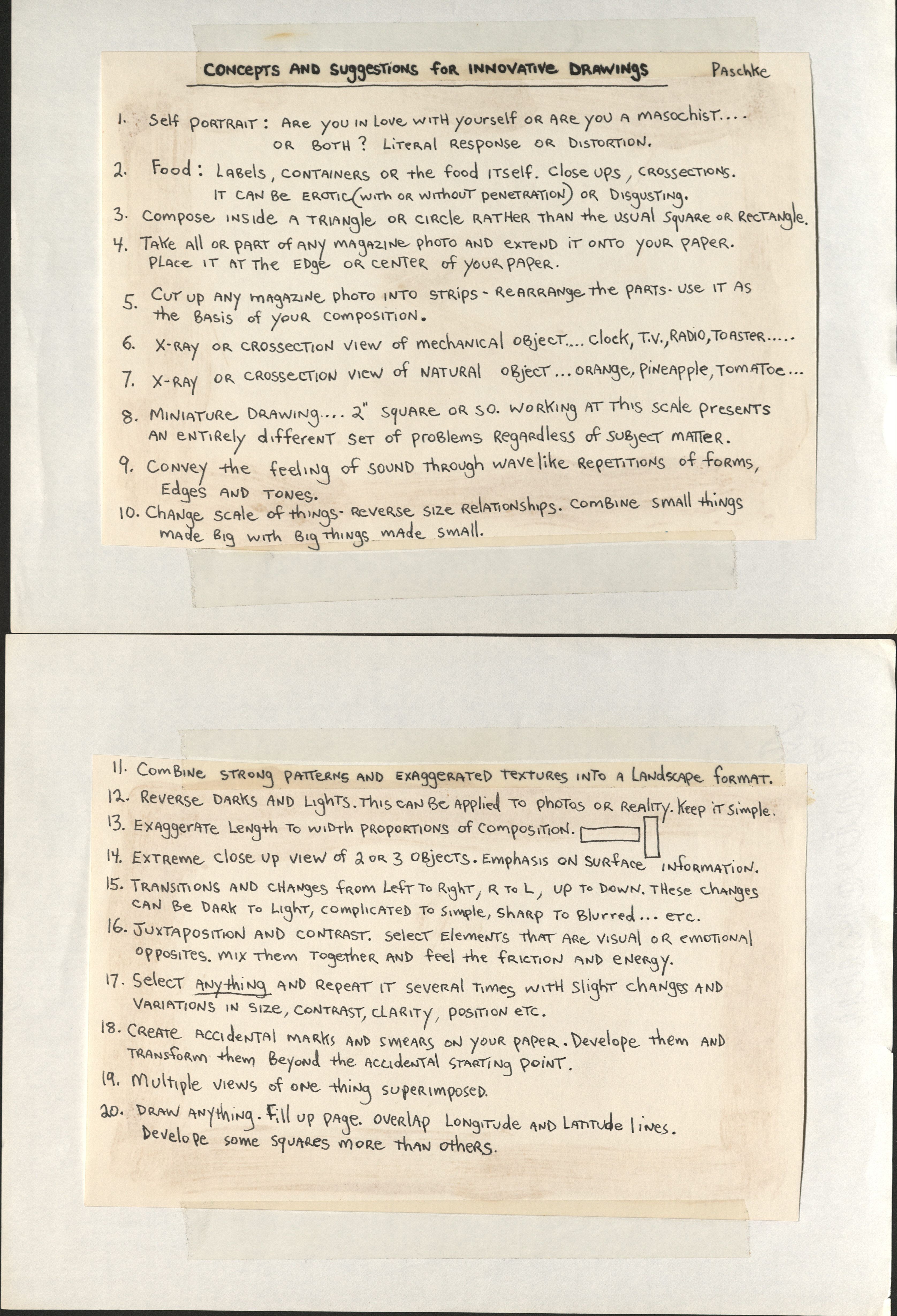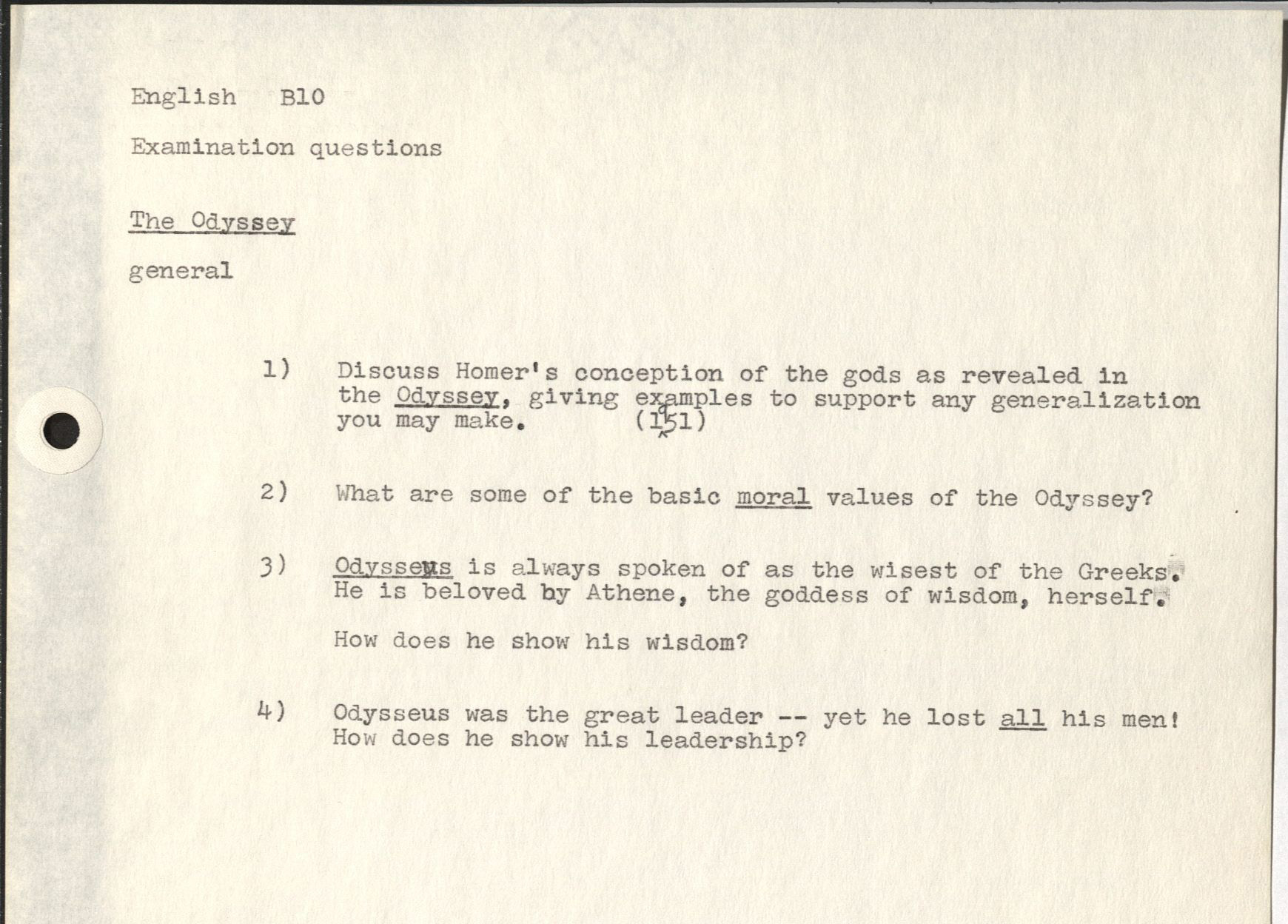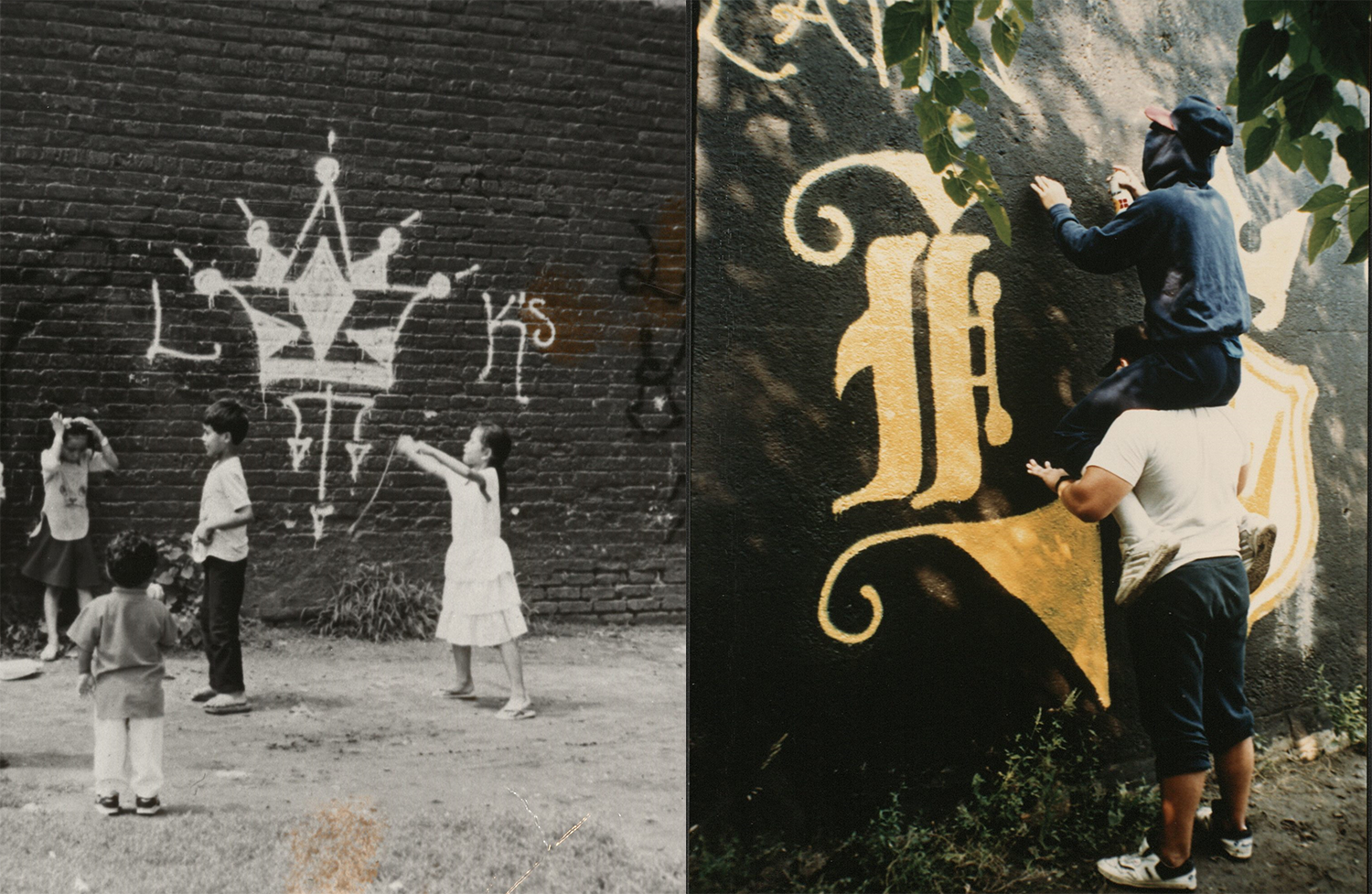Class never dismissed
Northwestern faculty can teach forever through the power of their archives
Every generation of Wildcats remembers those professors: the ones who got through to you, whose lectures held you rapt, whose positive word-of-mouth reviews meant you’d need an early appointment at class registration to get a seat.
And for the ones who deposit their papers in University Archives, those influential lessons never stop. Lectures, research notes, book manuscripts, and even exam answer keys— the evidence of entire careers resides in the Archives.
University historian Kevin Leonard demurred when asked if there is a comprehensive list of faculty in the Archives. He was worried he’d omit someone.
“It would be quite an undertaking,” he said. “There is an impressive number of faculty who deposited their papers with us.”
University archivist Matt Richardson said the scores of faculty donations are a sign that these educators believe in leaving behind a teaching and research legacy.
"What’s humbling is that they trust us to preserve that legacy for posterity,” he said.
Art history professor emeritus S. Hollis Clayson had posterity in mind when depositing her own teaching materials and professional lectures after her retirement in 2020.
“I very much liked the idea of the material being catalogued and preserved as opposed to gathering dust in my own filing cabinets,” she said. “I imagined the material being used by someone in the future as a guide to teaching art history courses at Northwestern.”
Clayson tested her theory when she came back to teach a 300-level class earlier this year. Her materials from a 2019 course were easy to access, and they proved relevant in her planning. They may be useful for a future scholar too.
“Perhaps some up-and-coming art historian would want to take a glimpse at my research presentations to track the development of my scholarship,” she said.
In addition to Clayson, the rolls of faculty and emeriti found in the archives include the economist Dale Mortensen (d. 2014), winner of the 2010 Nobel Prize for his analysis of markets with search frictions; Sir Fraser Stoddart (d. 2024), a Nobel laureate in chemistry for his work on molecular machine nanotechnology; Tony Award–winning theatre director Frank Galati (d. 2023); Oswald Werner (d. 2023), a linguistics and anthropology researcher whose work centered on the American Southwest and the Navajo people; Ed Paschke (d. 2004), who taught for 26 years despite being an internationally renowned artist; Charles Moskos (d. 2008), a military sociologist whose student-favorite Introduction to Sociology class is only slightly less famous than his work on the 1993 “Don’t Ask, Don’t Tell” policy; and Garry Wills, the lauded historian still returning to his own archive, like Clayson, in creating new works.

The collections span all eras. Here is just a sampling of impactful archives from Northwestern faculty who taught in the 20th century. To read more about these collections, or any other processed archive, visit the libraries' finding aids.
Mathematician Ernst Hellinger (d. 1950) introduced the Hellinger integral, a useful tool in probability theory, and contributed to a theory about infinite variable forms used in mathematical analysis. His collection contains his handwritten lecture notes and letters about quantum mechanics as well as a research project that he presented at a major conference in 1938.
Henry Crew (d. 1953) became an influential educator in the period of transition from classical to modern physics. Crew’s collection contains his correspondence with other leading scientists about the emerging field of experimental physics as well as over 40 diaries spanning 77 years of his life.
Naturalist poet Lew Sarett (d. 1954) captivated students with an oration style honed on the famous Chautauqua lecture circuit, where he spoke on his favorite topics: the virtues of nature over civilization and his immersion in American Indian communities. Hundreds of newspaper clippings and letters reveal how deeply his poetry collections Many, Many Moons (1920) and Box of God (1922) resonated with a national fan base. His papers also include teaching materials and manuscripts.
Isaac Abt (d. 1955) pioneered pediatric nutrition research, writing several books on children’s health and developing an electric breast milk pump and infant incubator technology. Abt’s collection documents his impact on pediatric clinics, with records of protocols developed in response to his groundbreaking research on infant nutrition.
Before William McGovern (d. 1964) joined the Northwestern faculty in 1929, he had already achieved international acclaim as an explorer, famously sneaking into Tibet in 1922 when it was closed to Westerners. His collection includes two 16mm reels of his film To Lhasa in Disguise and 30 glass negative slides of the trip in addition to correspondence, manuscripts, and teaching materials. During his 35-year academic career, he was known as a charismatic if eccentric storyteller whose showmanship captivated students while sometimes vexing colleagues.
Over his 33-year career at Northwestern, Kenneth Colegrove (d. 1975) was recognized as an expert on Asian geopolitics, serving as General Douglas MacArthur’s adviser during the postwar occupation of Japan. Colegrove’s papers include notes, drafts, and transliterations of the Japanese constitution, which he helped write and implement after the war. Even more than his teaching and research materials, these documents have ensured the heavy use of Colegrove’s archive over time.
At one time, Bergen Evans’s wildly popular course, B-10 Introduction to Literature, enrolled more students than any other class at Northwestern. During his 40-year career here, Evans (d. 1978) also curated an eclectic career as a master of wordplay and wit, authoring books about language, hosting radio and television shows (most famously, the game show Down You Go in the 1950s), and even writing for The $64,000 Question. His archive contains teaching materials for B-10 and files from his radio and TV work.

Performance studies professor Alvina Krause (d. 1981) innovated the instructional model still used in Northwestern’s acting curriculum and was foundational to the program’s national reputation. Her collection captures her teaching approach in course notes and her feedback to cast members as well as transcripts of recorded class sessions.
As the nation’s top UFO expert, astronomer J. Allen Hynek (d. 1986) advocated for legitimate scientific consideration of a subject widely considered conspiratorial. His work with the Air Force led to the Hynek Scale, better known as the Close Encounter classification. His papers document his involvement with Project Stargazer (the Air Force initiative to conduct telescope work from high-altitude balloons) as well as correspondence surrounding his UFO inquiries.
Jean Hagstrum (d. 1995) was a scholar of 18th-century English literature and the relationship between poetry and painting. He held several distinctions and titles, including a Guggenheim Fellowship and a position on the Newberry Library Board of Trustees. Hagstrum’s international scholarship is captured in his correspondence with organizations and colleagues from various countries in Europe.
Donald Campbell (d. 1997) was a social psychologist who coined the term evolutionary epistemology to define a unifying theory of human knowledge in which scientific theories evolve according to a Darwinian selection process. His collection fills over 200 boxes and contains his research on ethnocentrism and examination of African tribes in addition to administrative files from his work with the American Psychological Association and records of his lectures at several top universities.
Novelist and playwright Leon Forrest (d. 1997) blended African American oral traditions, jazz, and literary influences into his narrative style. Northwestern University Press recently republished his 1992 book Divine Days with edits and corrections that he requested but that never made it into the first edition. Forrest taught popular, innovative Black history and literature courses. His papers include manuscripts, class syllabi, and research notes.
An economist and prolific writer, Robert Eisner (d. 1998) committed himself to making economic issues understandable not only to students but to general audiences through newswriting and radio and television appearances. Aside from newspaper clippings and research records, Eisner’s collection captures his national importance via congressional testimony documents and letters to legislators.
Richard Leopold (d. 2006) was a historian of American diplomacy and is the eponym of the Leopold Prize, which is awarded biannually for the best historian-written books on the activities of the federal government. His extensive collection includes correspondence with other prominent scholars as well as records of his work with organizations such as the American Historical Association and the National Archives.
From his laboratory research on gas masks during World War II to his discovery of the Dole Effect, Malcolm Dole (d. 1990) was a crucial and institutionally honored chemistry expert. (The Dole Effect pertains to an oxygen isotope cycle with implications for the study of climate change.) His collection contains datebooks, scrapbooks, and clippings detailing his wartime research alongside project proposals for experiments on cancer and radiation chemistry.
Dwight Conquergood (d. 2004) was a field researcher whose richly detailed cultural accounts of groups such as Hmong refugees and Chicago street gangs combated their misrepresentation in the media. Conquergood’s ethnographic work is captured in photographs, correspondence with his research subjects, scrapbooks, and letters from his collection.

Ethnographer Dwight Conquergood’s photo files include his research into street gangs of Chicago.
Biochemistry professor Irving Klotz (d. 2005) wrote his 1950 textbook Chemical Thermodynamics in a way could be understood by nonscientists, furthering the accessibility of scientific knowledge. Klotz’s collection captures his vast institutional involvement with the National Defense Research Committee during World War II and grant documents from the National Science Foundation and the National Institutes of Health, while his popularity at Northwestern is evidenced by several student requests to work in his lab.
A 2012 obituary noted that Arlene Daniels’s “colorful, witty, and generous presence enlivened the field of sociology.” She specialized in research on the role of women in society, including the intersection of feminism and volunteer work, women in trade unions, and standard media portrayals of the housewife. Daniels’s collection contains the interview transcripts that anchored several of her research findings and are featured along with meeting notes and research grant proposals from her work with sociological and feminist organizations such as the Women’s Equity Action League.
Communication studies professor Franklyn Haiman (d. 2015) was a free speech advocate who worked for the American Civil Liberties Union and published and lectured extensively on First Amendment rights. Haiman’s noteworthy professional and personal relationships are captured in his correspondence with Supreme Court justice Ruth Bader Ginsburg and his notes on John F. Kennedy and Bill Clinton in addition to organizational records and meeting minutes from the ACLU.